Sarwa review 2026 for Emiratis & Expats
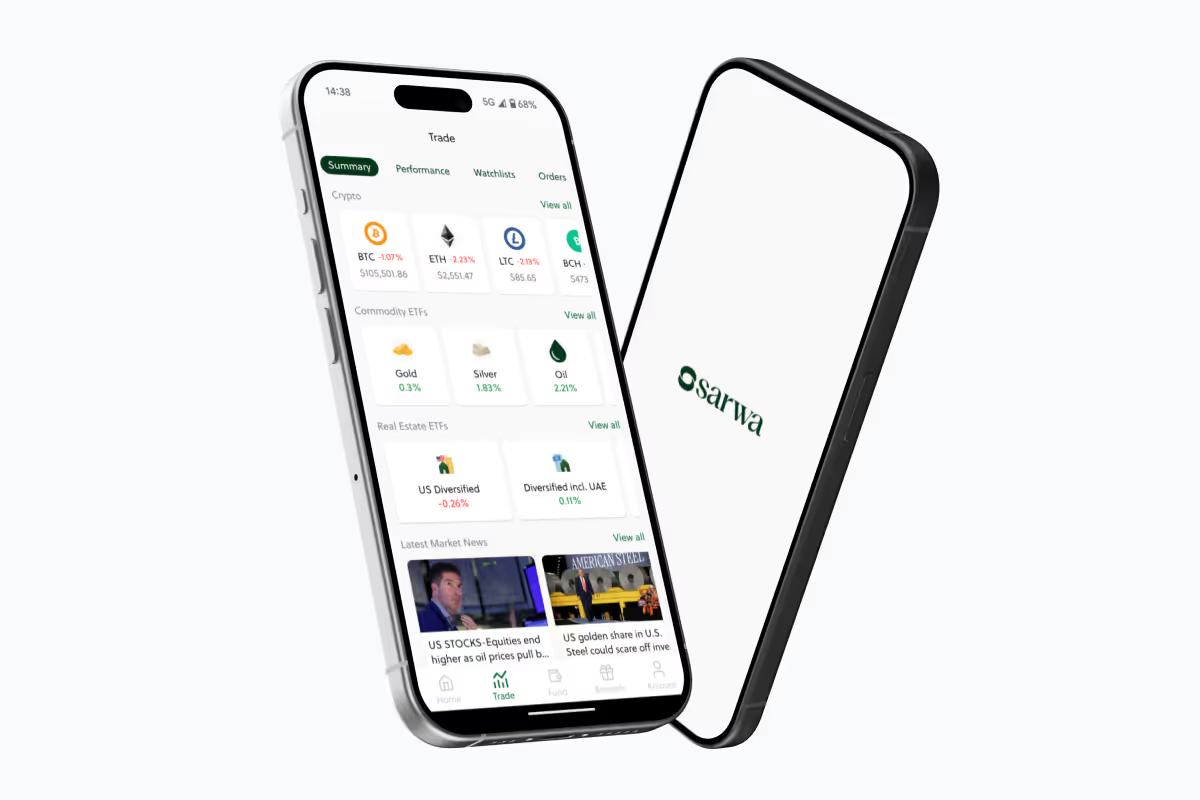
Sarwa is one of the UAE’s homegrown investing platforms that lets you trade, invest, and save all from a single app. The platform has attracted over 180,000 registered users and is tailored to Emiratis and Expats who want global market access with local convenience.
But does Sarwa’s higher-than-average fee structure and limited market access hold it back compared to global brokers like Interactive Brokers or eToro?
In this review, we answer the question above and break down Sarwa’s features, fees, pros, and cons, comparing it with alternatives so that UAE investors can decide if it’s the right fit.
Bonus: 🎁 Want to open a Sarwa account? Use our referral code RLLAA29D when signing up and get up to AED 3,000 bonus after depositing at least USD 500.
Video summary
Want a summarized video review? Check this out:
Sarwa UAE overview
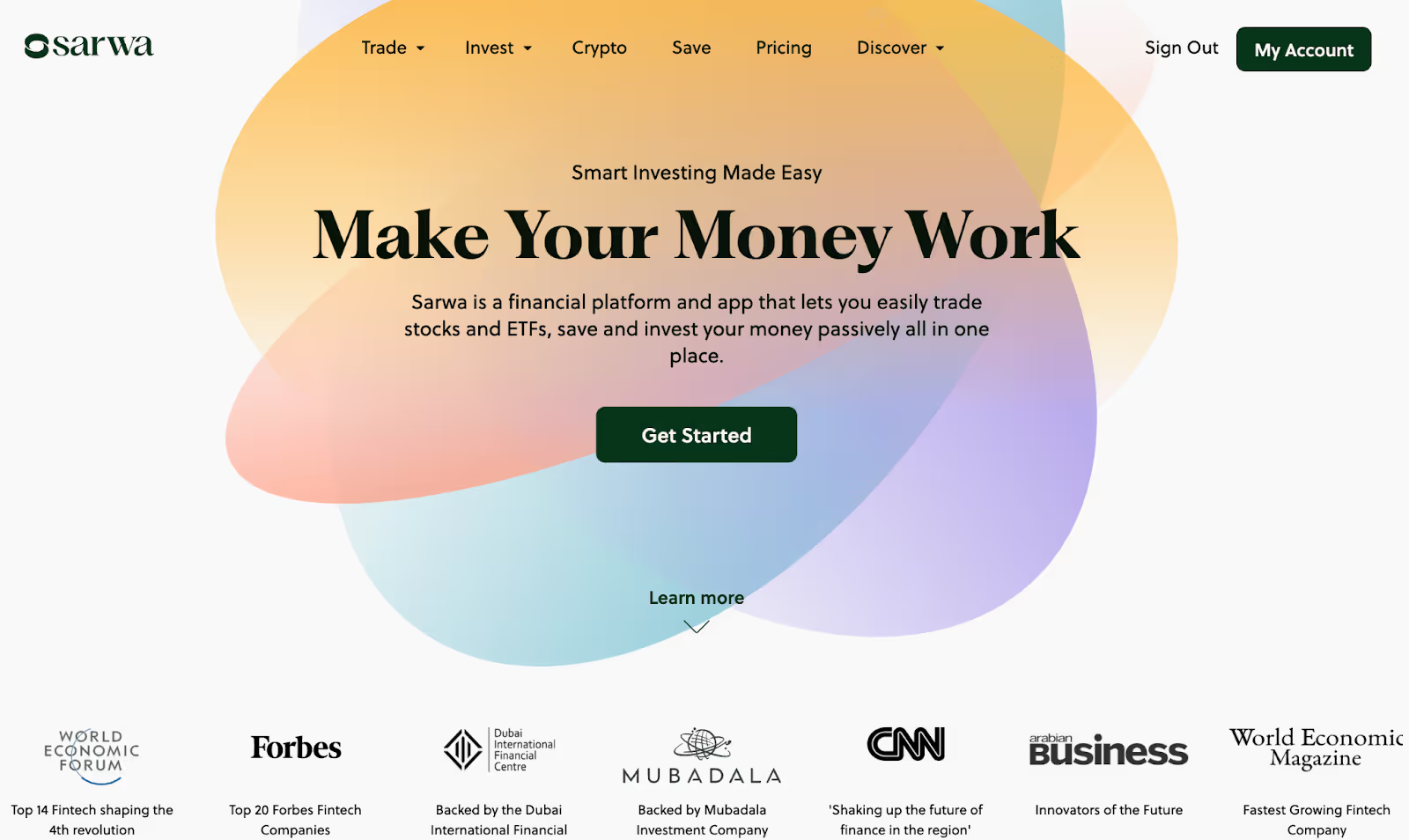
Sarwa was launched in 2017 as one of the first robo-advisory platforms in the UAE. The platform has over $800 million in AUM and bundles three products in the app:
- Sarwa Invest: Hands-off, ETF-based portfolio matched to your risk level. Sarwa builds, rebalances, and reinvests dividends for long-term growth.
- Sarwa Trade: DIY account for US stocks, ETFs, and options on mobile.
- Sarwa Crypto: A dedicated feature within the app for buying and selling a curated list of major cryptocurrencies.
- Sarwa Save: USD cash account that pays a competitive yield with quick transfers.
The platform is ideal for first-time investors who prefer a simple onboarding process and guidance. It also suits busy professionals who want a single place to invest, trade, and store cash.
Mark Chahwan (Co-founder, Sarwa) and his team have built Sarwa for Emiratis and Expats due to their strong belief in the UAE market.
Here’s what Mark wrote in his recent LinkedIn post:
"The UAE is one of the best places in the world to anchor wealth; no capital gains tax, a USD peg, stable regulation, and the ability to keep stocks, crypto, gold, and real estate under one roof."
Mark Chahwan (Co-founder, Sarwa)
Sarwa is regulated by the Abu Dhabi Global Market (ADGM) Financial Services Regulatory Authority.
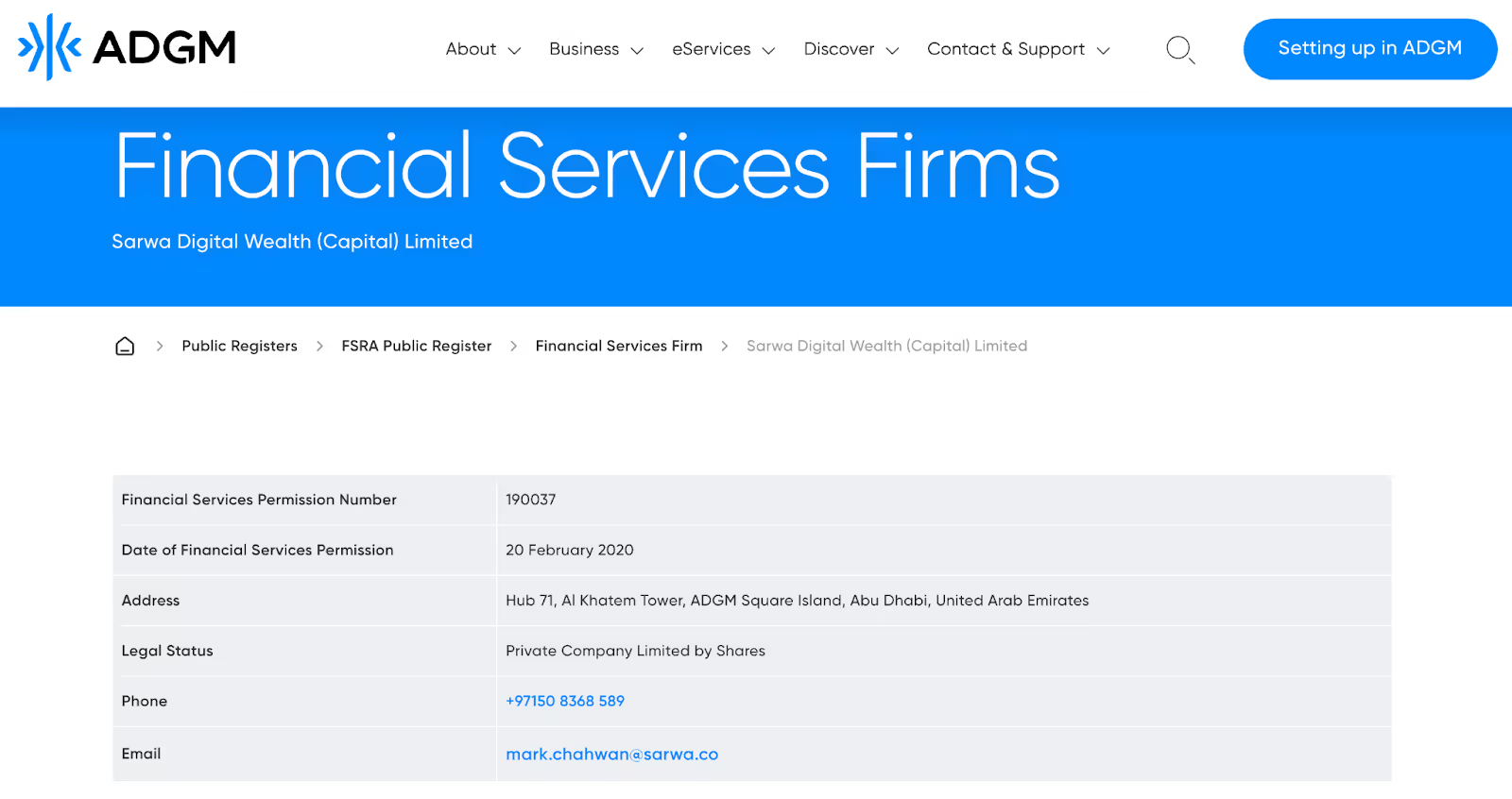
Under ADGM’s oversight, client funds and securities are held with regulated custodians, ensuring they remain segregated and protected. Local AED bank transfers are also fully supported for easy funding and withdrawals.
The app is available in both English and Arabic, and so is their customer support.
Highlights
For those short on time, the table below provides a quick summary of Sarwa’s key features and terms for UAE investors.
Pros
- Beginner-friendly, ‘auto-pilot’ investing: Sarwa Invest offers a hands-off experience; you answer a questionnaire and get a pre-built portfolio of ETFs that Sarwa automatically rebalances and manages.
- Easy to start and use: Users frequently praise Sarwa’s slick, easy-to-use mobile app and quick onboarding process. The interface is clean and modern, making the whole process, from signing up and completing KYC to funding your account, smooth.
- All-in-one platform with multiple products: With Sarwa, you get a robo-advisor, a trading account, and a cash savings account all in one app.
- Transparency and strong reputation: Even though Sarwa is a startup and a private company, it’s backed by well-known investors (including Mubadala) and led by a serious, talented team. The firm started as a robo-advisor and expanded into trading and savings based on client demand. Unlike many brokers, it does not offer high-risk products like CFDs, showing genuine alignment with investors’ long-term success.
- Customer support with a human touch: Sarwa’s team is generally responsive. You can schedule calls with advisors, ensuring a good balance between a smooth digital app experience and real human guidance when needed.
- Attractive signup bonus: New users can receive an AED 3,000 referral bonus when signing up and meeting the minimum deposit requirement.
- Local convenience and peace of mind: Being a UAE-based platform, Sarwa offers conveniences like free local bank transfers in AED, no hidden fees on withdrawals or inactivity, and local regulatory oversight. There are no account opening/closing charges, no custody fees, and no inactivity fees eating away at your balance.
Cons
- Higher fees vs DIY alternatives: The most common criticism of Sarwa is its fees. For Sarwa Invest, the annual 0.85% management fee (on balances under $100k) and a $7 minimum monthly fee are high, especially since you could invest on your own and pay a 0% advisory fee. For some, this is okay: some people prefer to pay 0.85%/yr for simplicity rather than stress over transfers, FX, ETF codes, etc.
- Limited market and instrument selection: Sarwa’s offerings are constrained to the US market and certain assets.You can only trade US-listed stocks and ETFs; there’s no access to other markets like Europe or Asia, no individual UAE/GCC stocks, and no direct bond trading.
- Tax inefficiencies: Since Sarwa only provides access to US-listed securities, investors face several additional taxes:
- A 30% dividend withholding tax on US-domiciled ETFs and stocks (vs. 15% on Irish UCITS ETFs under certain treaties).
- Potential exposure to the US estate tax, which applies to non-US investors with more than $60,000 in US assets, at rates up to 40% if they die. - DIY investors could outgrow Sarwa: Sarwa is a great starter platform, but not a forever platform. As your portfolio grows and you become more comfortable, you might prefer to switch to platforms like Interactive Brokers or others that offer lower fees and a broader array of markets. The fact that Sarwa’s portfolios can be replicated with a bit of learning means that down the line, you will question paying 0.5-0.8% yearly for Sarwa’s convenience.
Who is Sarwa for?
Sarwa is best suited for UAE investors who:
- Seek a beginner-friendly approach to investing in global markets without selecting individual stocks.
- Want exposure to global markets.
- Prefer an ‘auto-pilot’ approach through managed portfolios or want an all-in-one app for investing, trading, and saving.
- Are looking for local support, AED funding, and the option of Shariah-compliant portfolios.
If you’re an Emirati or Expat in the UAE who wants to start investing with as little as $500, Sarwa offers a simple entry point.
Sarwa fees and commissions
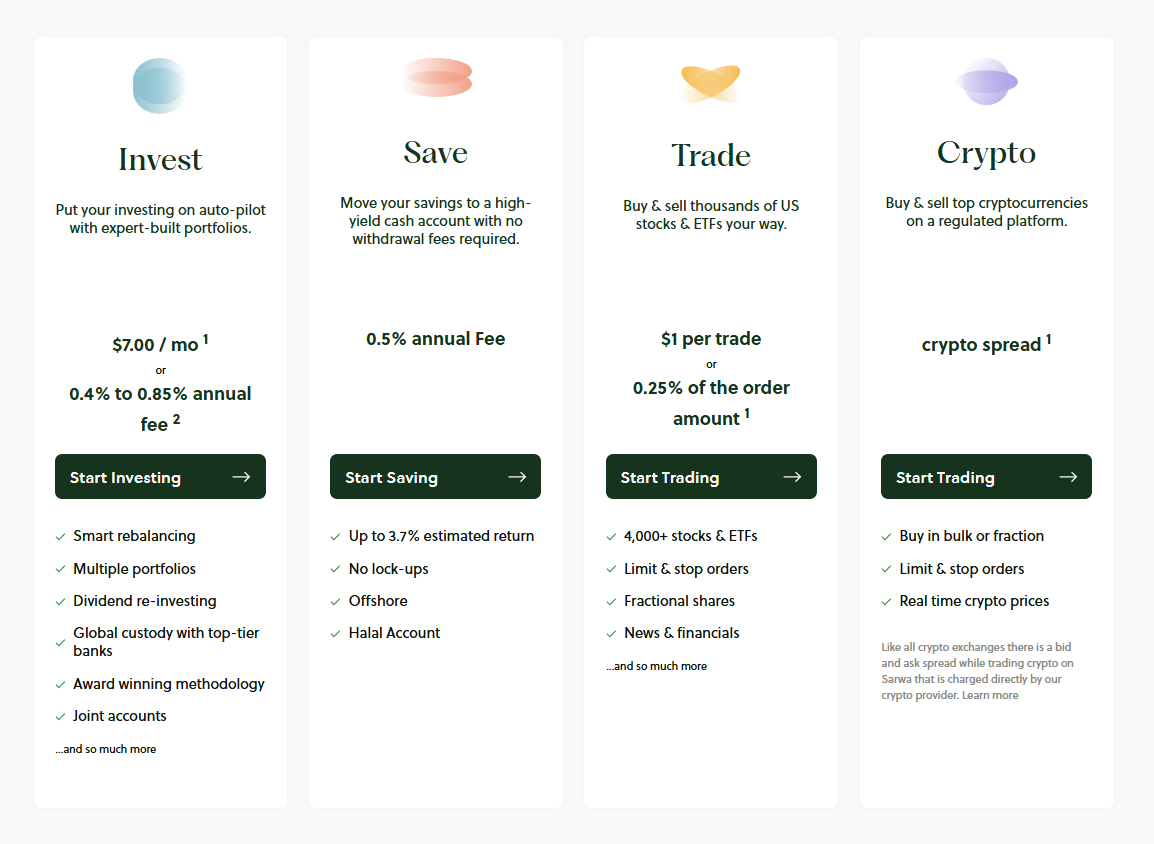
Fees and commissions charged by Sarwa depend on the product you use: Invest, Trade, Crypto, or Save. Each has its own fee structure. Here’s the breakdown:
Sarwa Invest fees
Sarwa Invest operates on a tiered annual management fee based on the total value of your managed portfolios. The fee is calculated daily but charged monthly. The tiers are:
- Standard: 0.85% for balances under $100,000
- Platinum: 0.7% for balances from $100,000 to $500,000
- Private Wealth: 0.5% for balances over $500,000
- Legacy: 0.4% for balances over $5,000,000
There’s a $7 minimum monthly fee, which is waived for the first three months. This minimum charge has a significant impact on smaller accounts.
For example, an investor with a $1,000 portfolio would expect to pay around $0.71 per month based on the 0.85% annual rate. However, due to the minimum charge, they will pay $7.
This effectively raises their annual fee to $84, or 8.4% of their portfolio, which is drastically higher than the advertised rate. This minimum fee makes Sarwa Invest less cost-effective for those starting with very small amounts.
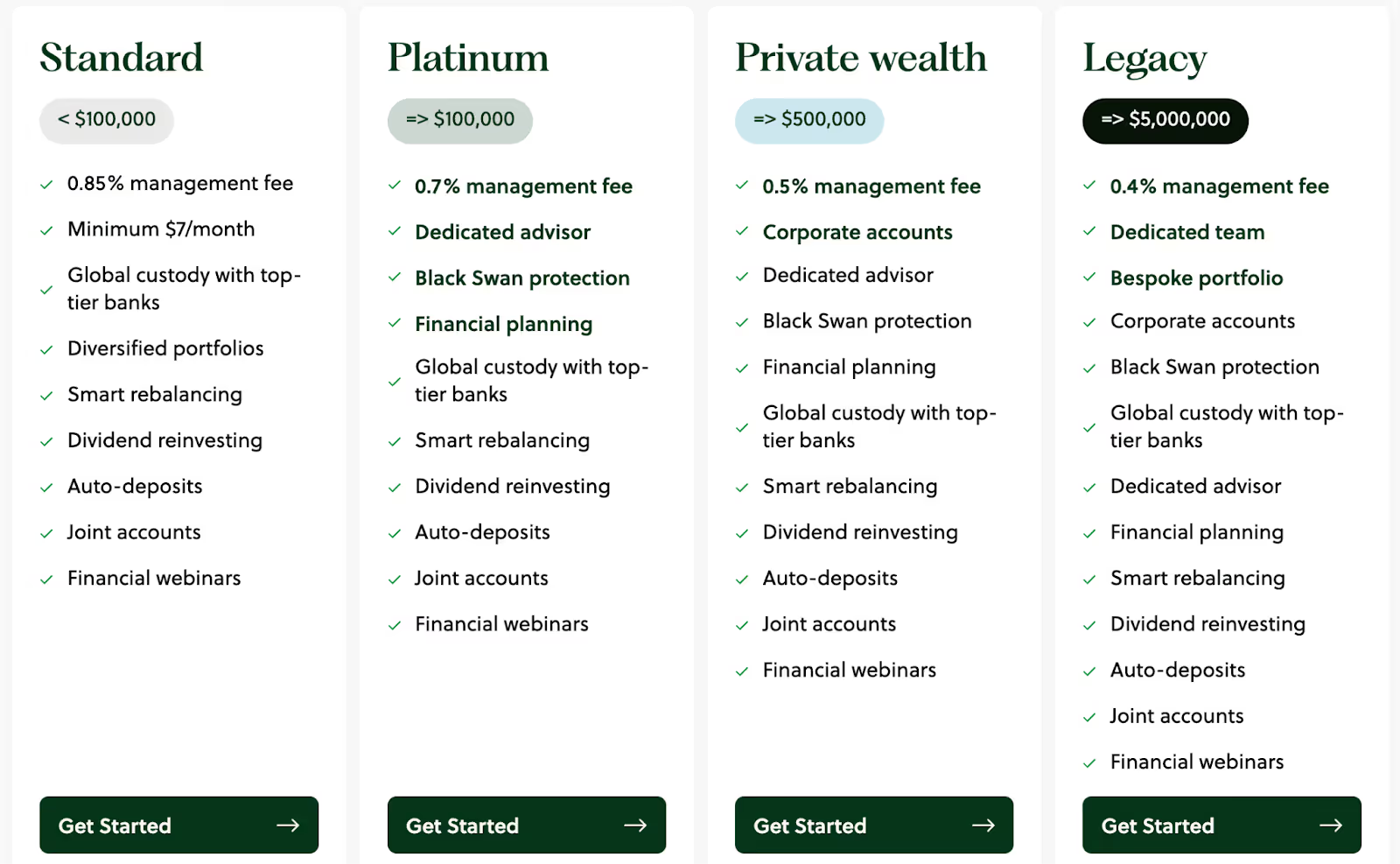
Sarwa Trade fees
For self-directed trading of stocks and ETFs, Sarwa charges a commission that is the greater of $1 or 0.25% of the total trade value. For options trading, the fee is a flat $4 per contract, regardless of whether you are buying or selling. While the fee structure is simple, it is not commission-free, and active traders may find lower costs on other platforms.
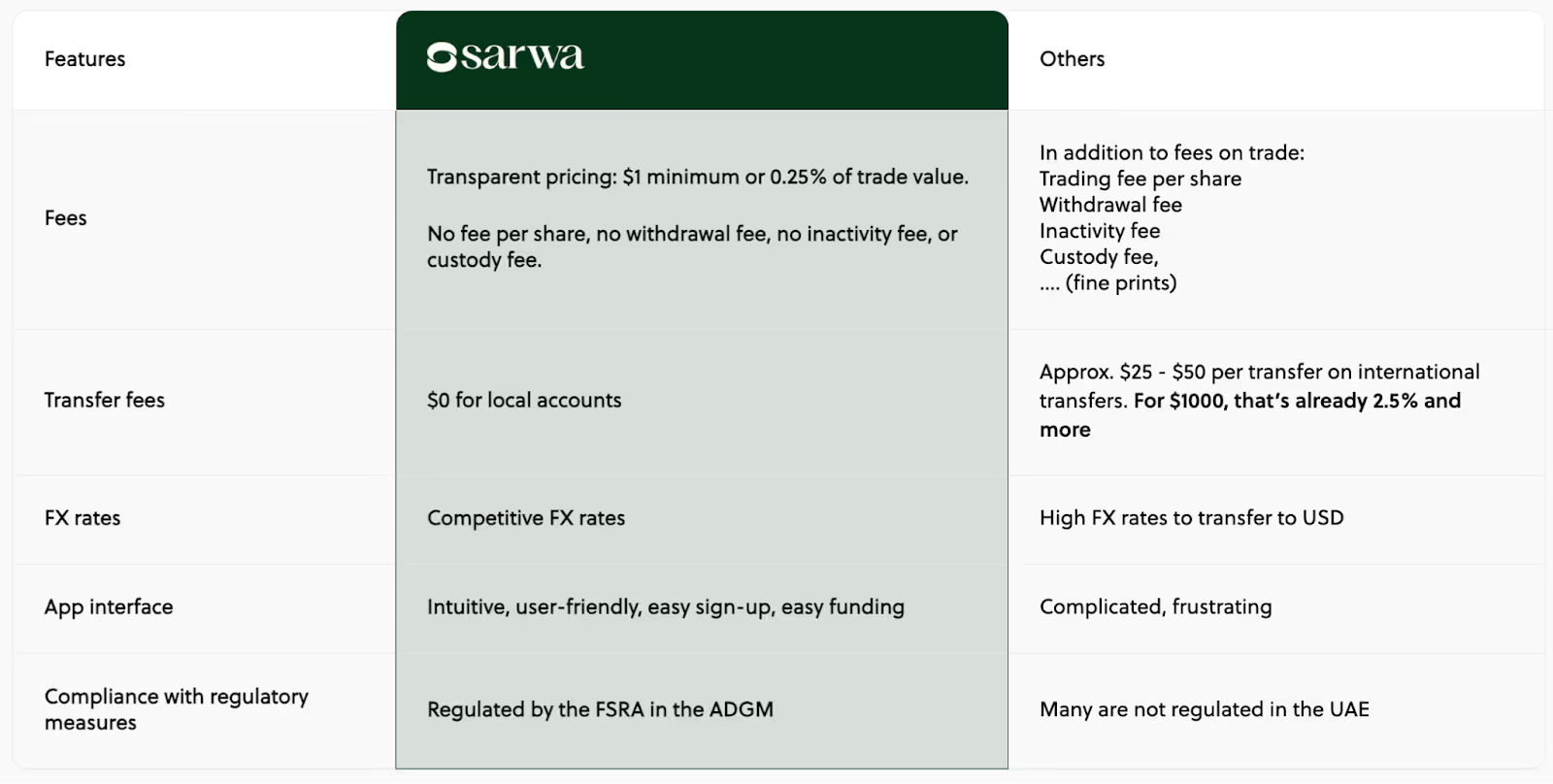
Sarwa Crypto fees
Sarwa does not charge a direct commission for crypto trades. Instead, it makes money through a 1.5% spread. This means the price you pay to buy a cryptocurrency is 1.5% higher than the market price, and the price you receive when you sell is 1.5% lower. This is a common practice but represents a significant cost, especially compared to other crypto exchanges that may charge fees well below 0.5%.

Other fees and commissions
- ETF expense ratios: When using Sarwa Invest, you indirectly pay the expense ratios of the underlying ETFs in their portfolio. These fees are charged by the fund providers (like Vanguard or BlackRock), not by Sarwa, and typically average around 0.1% per year.
- Currency conversion: While local AED transfers to fund an account are free, the investments are made in USD. Sarwa applies a currency conversion rate when you fund your account, which includes a small spread over the interbank rate.
Sarwa mobile app
The Sarwa mobile app is designed as a unified platform for UAE investors to manage all their investing needs on the go.
Through the app, you can invest automatically (Invest) or trade US stocks, ETFs, options, and crypto (Trade); all in one place.
It also allows you to access Sarwa Save, enabling you to park cash and earn interest directly within the app. The interface is clean and intuitive, designed for ease of use.
The app is free to download on iOS and Android, bringing the whole Sarwa experience that’s available on the web into your pocket.
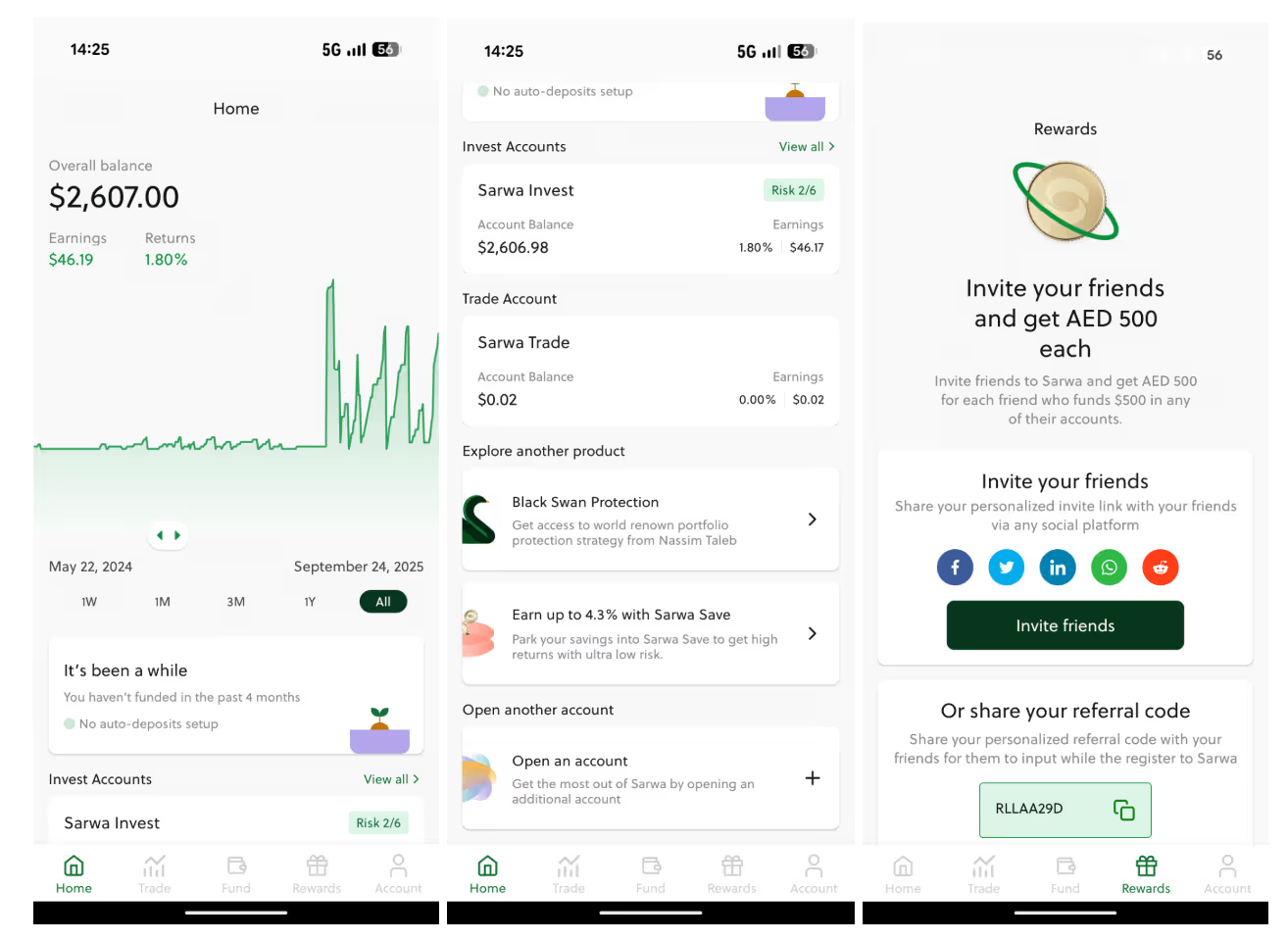
Is Sarwa safe?
Sarwa is one of the leading digital wealth platforms in the UAE and MENA region. It’s licensed by the Financial Services Regulatory Authority (FSRA) at ADGM, meaning it operates under strict rules on governance, compliance, and client asset protection.
While Sarwa is not a bank, it partners with regulated custodians like Saxo Bank, which hold client money and securities in segregated accounts, ensuring your assets remain protected even if Sarwa itself faced financial issues.
The company has built a strong reputation since launching in 2017, with backing from high-profile investors including Mubadala (Abu Dhabi’s sovereign wealth fund). Its founders, including CEO Mark Chahwan, are visible and transparent, regularly engaging with clients and investors on LinkedIn, YouTube, and other social media channels.
Unlike many trading apps, Sarwa does not offer leveraged products like CFDs. It started as a robo-advisor, then expanded into stock trading, crypto, and savings tools based on customer demand, showing alignment with investors’ long-term success.
Sarwa is generally considered secure and well-regulated. It is one of the most transparent and trusted fintech startups in the region. Funds are held with a regulated custodian (Saxo Bank), and it offers simple products aligned with investors’ long-term goals.
On the downside, it remains a young private company (it’s basically a startup), with a shorter track record than global incumbents. Furthermore, protections depend on the custodian (Saxo Bank), not Sarwa itself - in the UAE, there are no global investor protection schemes like SIPC (US) or FSCS (UK).
Here’s a quick table about several safety metrics:
Want to know more about regulation and the safety of your investments? Check our guide: Regulatory authorities and investor protection schemes in the UAE.
Sarwa UAE core features
Sarwa Trade
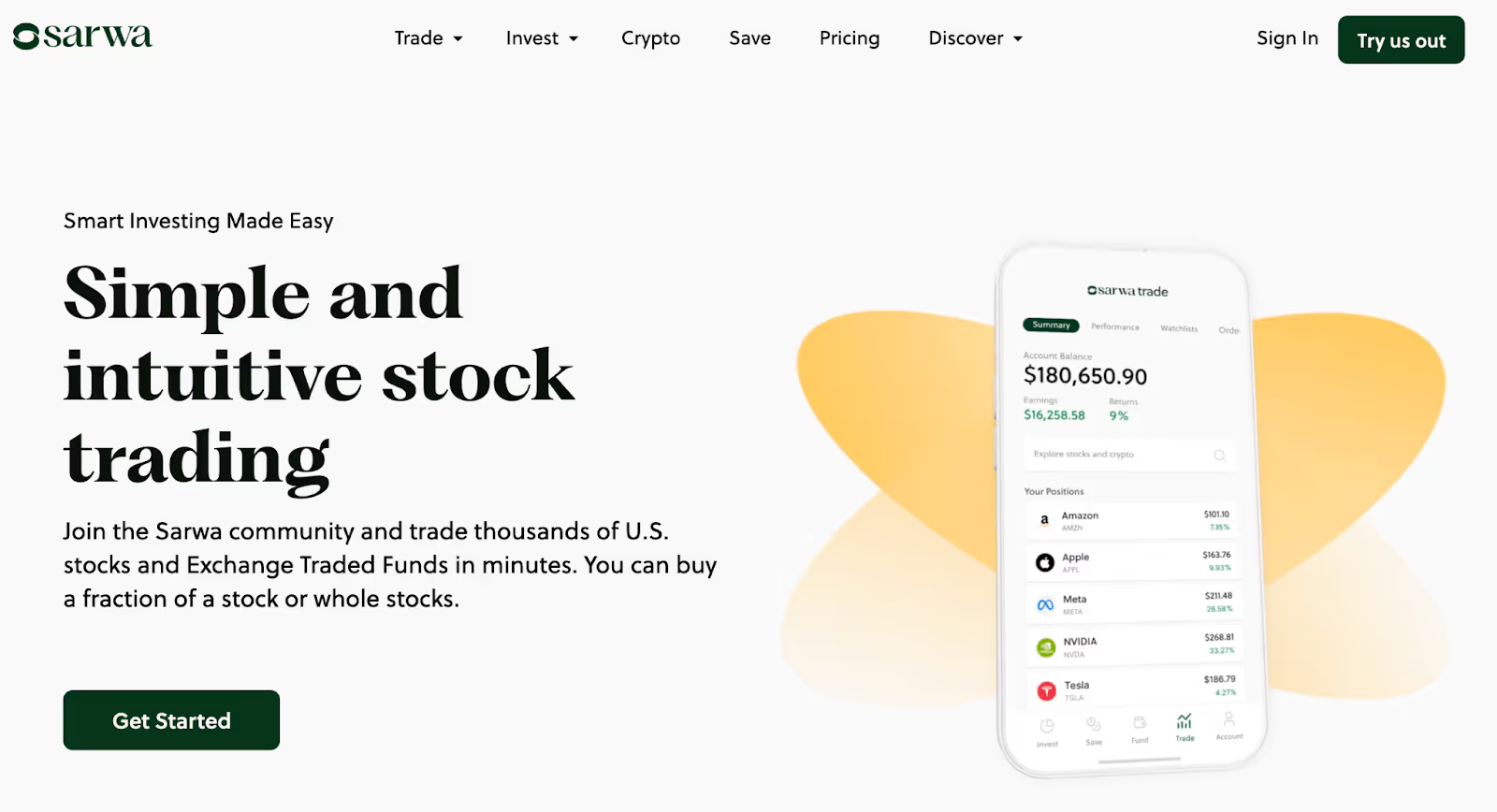
Sarwa Trade gives UAE investors direct access to US markets. You can buy and sell over 10,000 stocks and ETFs with no account minimum, plus invest in fractional shares starting from $1.
Orders can be placed as market or limit orders, all from the mobile app. Options trading is available at $4 per contract, making it one of the few locally regulated apps that offer this feature.
All trades settle in USD, and AED transfers are supported for easy funding.
Note: You can only access Sarwa Trade through the mobile app.
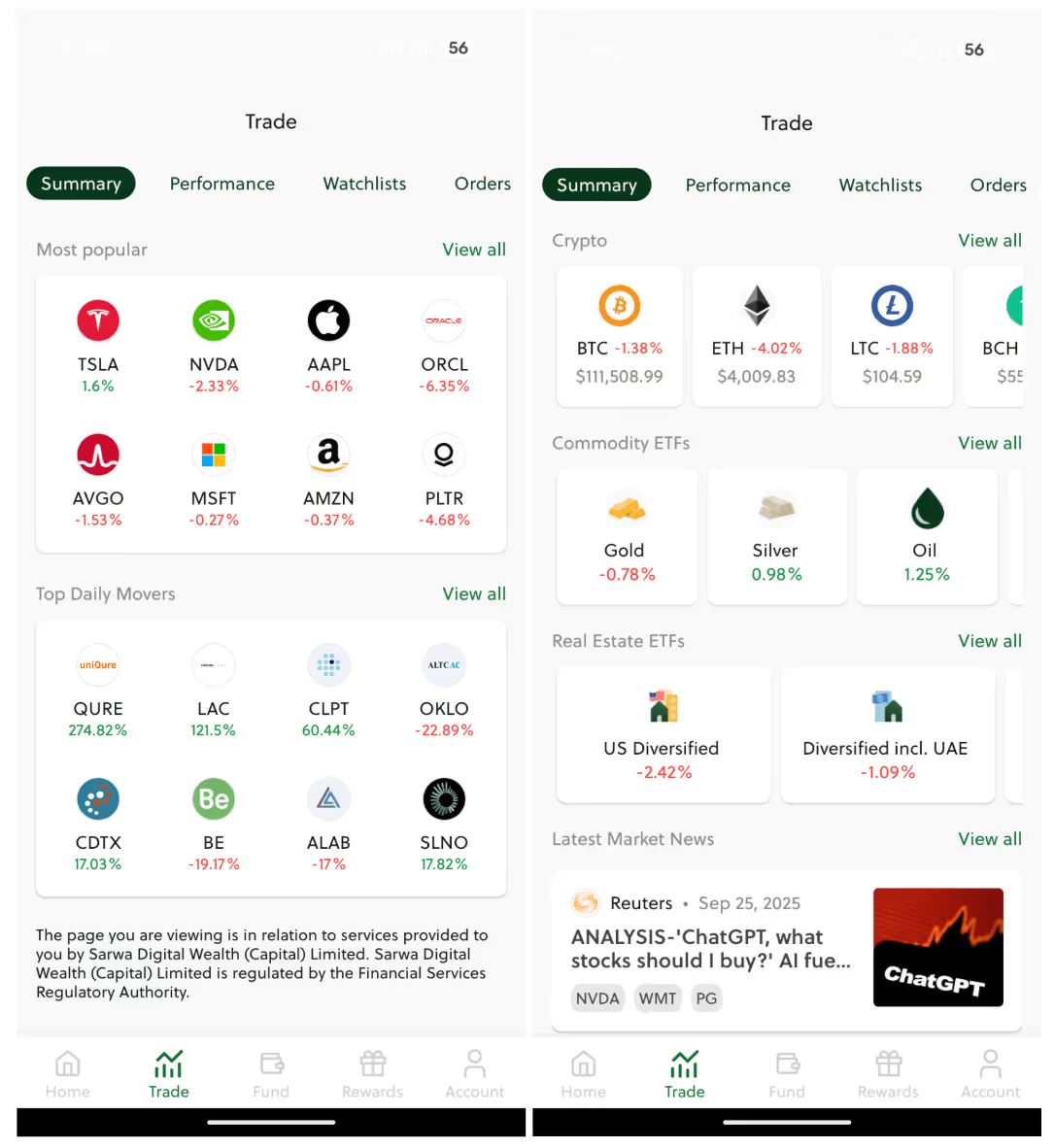
Sarwa Invest
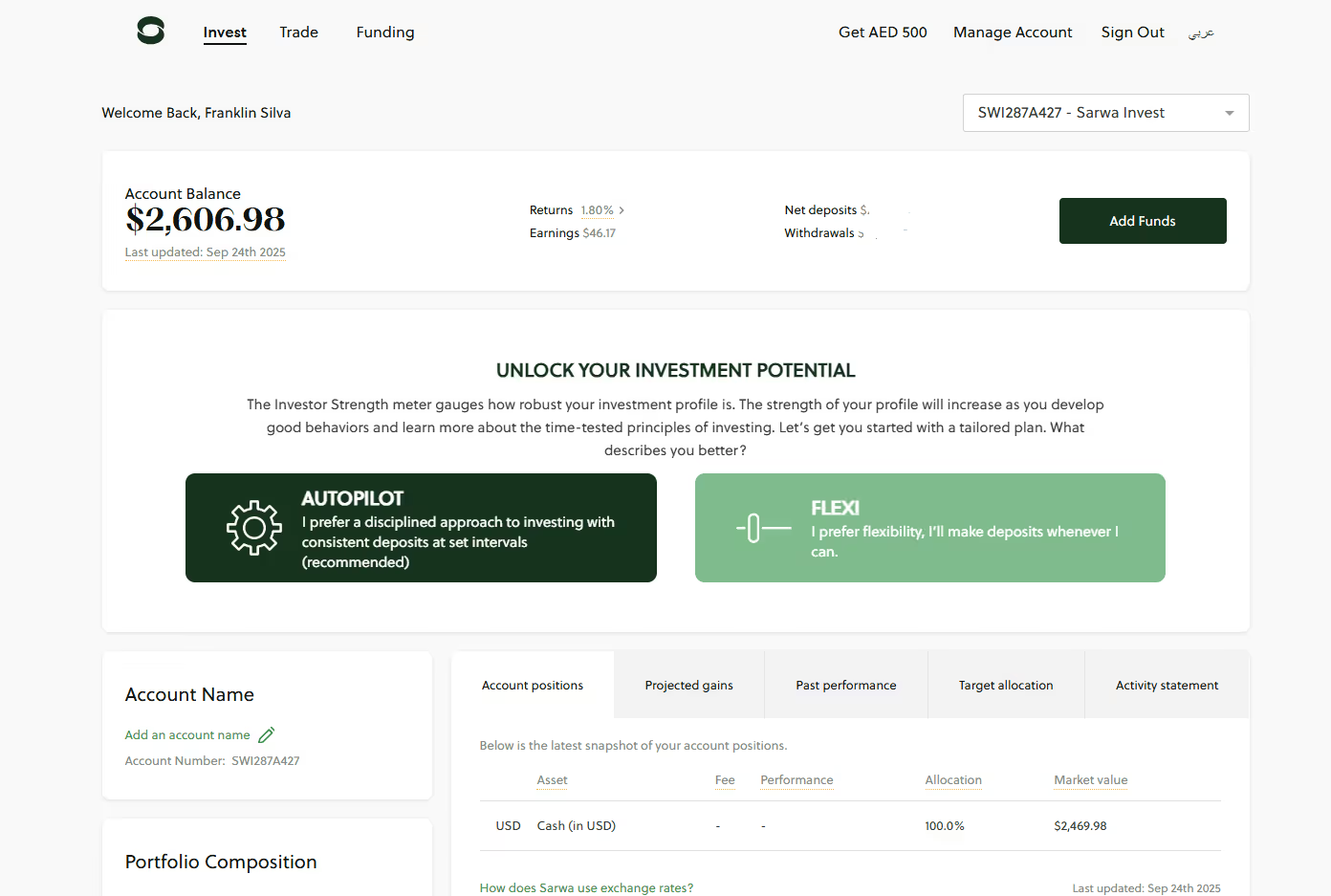
This is Sarwa’s robo-advisory service for hands-off investors. Portfolios are built using low-cost ETFs across the US, global, and emerging markets, plus bonds.
You answer a short questionnaire to set your risk level, and Sarwa handles rebalancing and dividend reinvesting. Minimum investment is $500.
To cater to different values and beliefs, Sarwa Invest offers several distinct portfolio types:
- Conventional: The standard portfolio, offering broad diversification across global stock and bond markets.
- Socially responsible (SRI): For investors who wish to align their money with their values, these portfolios consist of ETFs that screen for companies with strong environmental, social, and governance (ESG) practices. The minimum for SRI portfolios is $2,500.
- Halal: These portfolios are designed to comply with Islamic principles. They avoid industries like alcohol, gambling, and interest-based finance, instead investing in Shariah-compliant ETFs, Sukuk (Islamic bonds), and gold. The minimum is $500.
- Crypto: This option takes a conventional or SRI portfolio and adds a 5% allocation to a Bitcoin investment vehicle (Grayscale Bitcoin Trust), offering a small, managed exposure to the cryptocurrency market. The minimum is $2,500.
Sarwa Private Wealth
For portfolios above $500k, Sarwa provides a Private Wealth service. Investors benefit from lower annual fees, a dedicated advisor, and access to more advanced strategies like Black Swan Protection.
The service also includes broader financial planning support and priority access to Sarwa’s investment team. If you’re a high-net-worth Emirati or Expat who wants a private banking-style experience without going through traditional institutions, Sarwa’s Private Wealth feature is worth checking out.
Sarwa crypto trading
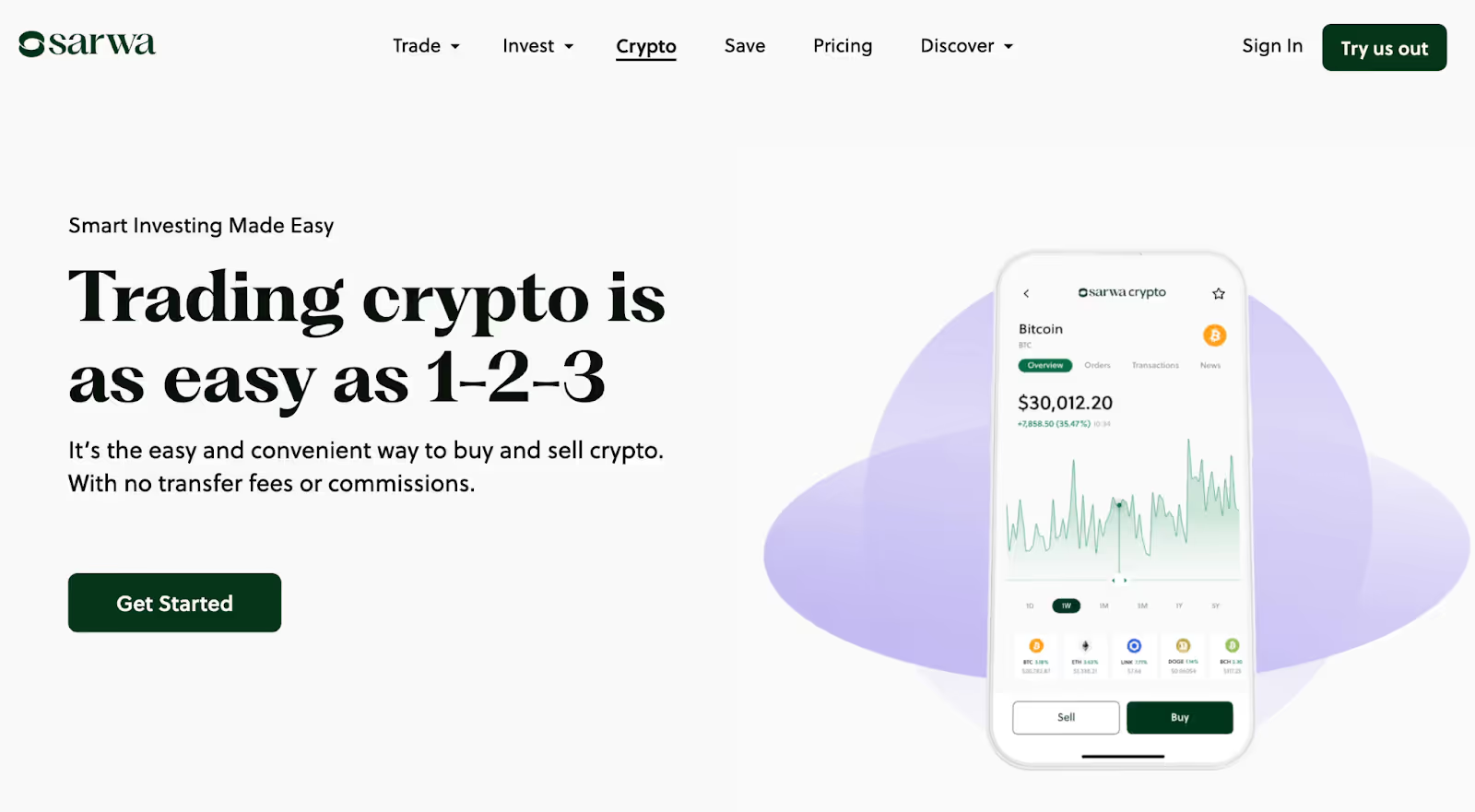
Sarwa integrates cryptocurrency trading directly into the app, allowing you to buy and sell major coins, such as Bitcoin, Ethereum, and Dogecoin. Trades carry no commission, but a 1.5% spread is applied. You can buy crypto in small amounts and track it alongside stocks and portfolios.
While withdrawals to external wallets are not supported, the setup provides UAE investors with convenient, regulated exposure to digital assets within the same platform they already use for stocks and ETFs.
Sarwa Save
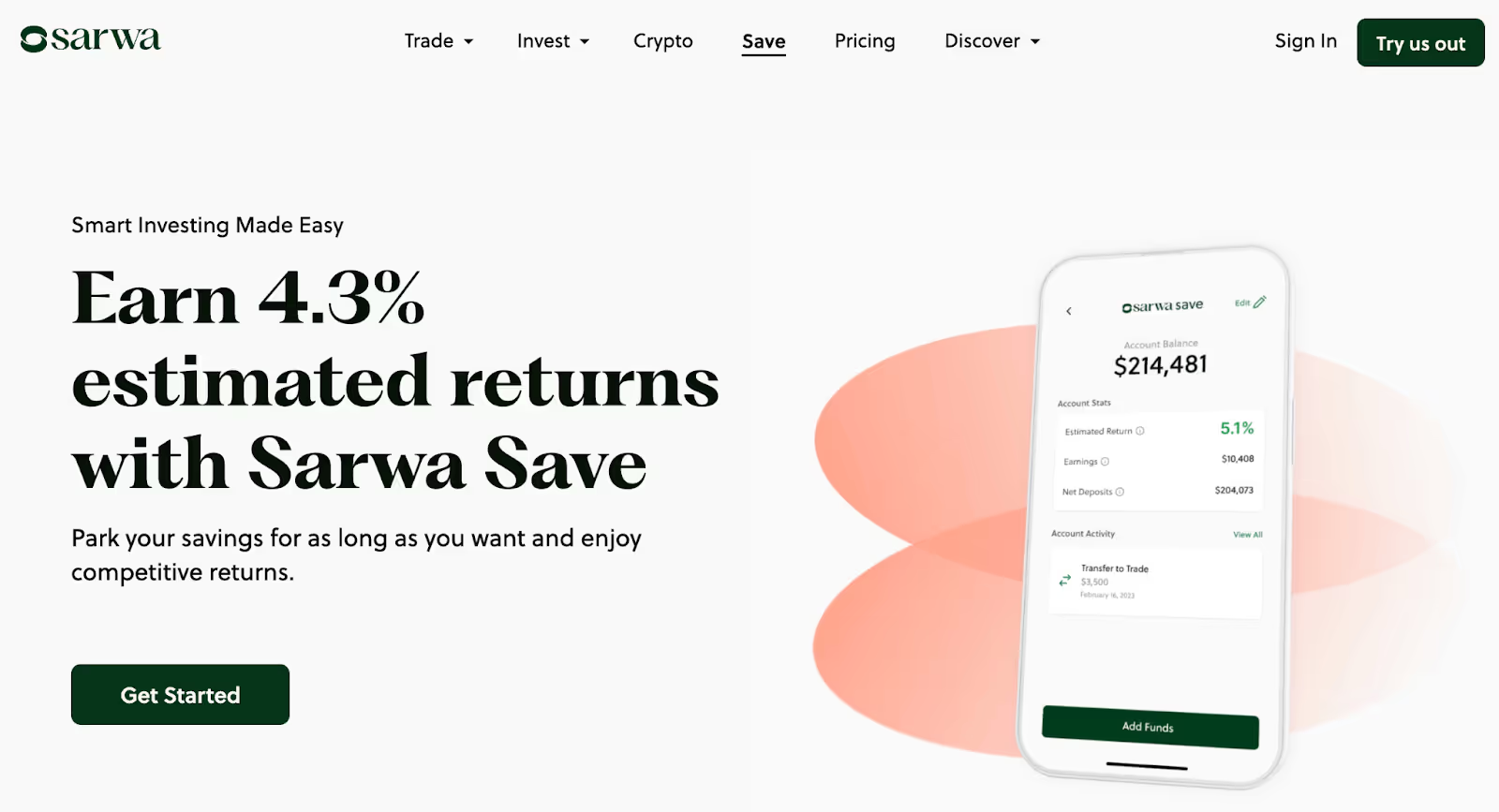
Sarwa Save is the platform's solution for cash management, designed as a modern alternative to traditional low-interest bank savings accounts.
It is a high-yield cash account that offers an estimated annual return of around 3.7% for Save+ accounts and 4% for Halal accounts (this rate is variable and tied to prevailing interest rates).
Instead of being a bank deposit, Sarwa Save invests clients' cash into very low-risk money market funds, which in turn invest in short-term government and corporate debt to generate a yield.
The key benefits are its high return relative to banks, complete liquidity with no lock-in periods or withdrawal fees, and the availability of a Halal option that invests in a Shariah-compliant money market fund.

You can check other alternatives in our guide:
Sarwa vs Alternatives
There are a lot of alternatives for Sarwa, but here are the top two in the UAE investing space:
- Interactive Brokers (IBKR): IBKR is a global broker that offers UAE residents access to thousands of markets worldwide. It is known for ultra-low fees. For US stocks, the IBKR Pro plan offers fixed pricing of $0.005 per share with a $1 minimum per trade, making it highly cost-effective for larger or frequent trades.
- eToro: eToro is a popular multi-asset broker offering commission-free US stock trading, a wide range of global ETFs, and crypto. It’s best known for its ‘copy trading’ feature, which allows you to follow and replicate top traders. While user-friendly, investors should be aware of other costs. eToro charges a fixed $5 fee on all withdrawals and applies currency conversion fees to non-USD deposits, which can impact overall returns for UAE-based users funding their accounts with AED.
- XTB: XTB is a global broker offering commission-free trading on stocks and ETFs up to €100,000 in monthly volume. Beyond that, a 0.20% fee applies. It’s regulated in the UAE and provides access to global markets with user-friendly platforms, though a 0.5% currency conversion fee can add costs for AED-funded accounts.
Want to compare Sarwa vs IBKR or Sarwa vs eToro or Baraka? Check our UAE trading app comparison.
Is Sarwa worth it?
Sarwa makes global investing accessible in the UAE by combining robo-advisory, US stock, and crypto trading, along with a high-yield savings account, all into one app. For beginners and busy professionals, it offers convenience, local regulation, and even Halal portfolio options.
The main drawback, though, is its cost. Sarwa Invest’s 0.85% fee on a smaller balance, combined with the $7 minimum charge, makes it expensive for those with a small portfolio. There are cheaper options available on the market.
That said, Sarwa still outshines traditional banks and insurance-linked products in the UAE. Features like Sarwa Save give it ongoing appeal, even for investors who later switch to DIY brokers.
Our view: Sarwa is worth it if you’re starting your investment journey in the UAE or prefer the peace of mind that comes with a regulated, easy-to-use platform. Cost-conscious and advanced investors may eventually outgrow it, but it remains one of the most beginner-friendly options in the market.
Happy investing, and feel free to reach out to us in case you have any questions or feedback!
Read other investment guides:


